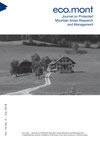亚南极生物圈保护区的人口减少和农村萎缩:设想年轻人的重新领土化
IF 0.8
4区 环境科学与生态学
Q4 BIODIVERSITY CONSERVATION
Eco Mont-Journal on Protected Mountain Areas Research
Pub Date : 2021-01-01
DOI:10.1553/eco.mont-13-sis108
引用次数: 5
摘要
区域层面的景观尺度保护是生物圈保护区面临的一个重要挑战,特别是那些位于人口减少和农村萎缩地区的生物圈保护区。这就是智利最南端麦哲伦地区的BRs的情况。文献中缺乏对非领土化(居民的急剧减少或消失,他们的传统生态做法,以及他们与领土的物质和情感联系)的影响的分析,特别是关于年轻人向其他人类住区移徙的分析。这对森林保护区来说是一个危急的情况,因为在人口减少和社会生态系统的可持续性之间有着密切的联系。在这里,我们一方面讨论了采掘业重新人口尝试的局限性和负面影响,另一方面讨论了让农村青年参与鼓励生态实践和知识重新领土化的倡议的可能性,这些实践和知识是由几代当地居民发展起来的,作为促进重新居住这些领土的生物文化可持续模式的一种方式。配置文件本文章由计算机程序翻译,如有差异,请以英文原文为准。
Depopulation and rural shrinkage in Subantarctic Biosphere Reserves: envisioning re-territorialization by young people
Landscape-scale conservation at the regional level is an important challenge for Biosphere Reserves (BRs), especially those located in areas suffering from depopulation and rural shrinkage. This is the case of the BRs of the southernmost part of Chile, in the Magallanes region. An analysis of the implications of deterritorialization (the radical reduction or disappearance of inhabitants, their traditional ecological practices, and their material and affective links with the territory) is lacking in the literature, particularly in relation to the migration of young people towards other human settlements. This is a critical situation for BRs because there is a tight link between depopulation and the sustainability of socio-ecological systems. Here we discuss, on the one hand, the limitations and negative impacts of repopulation attempts by extractive industries and, on the other, the possibilities of involving rural youth in initiatives that encourage the re-territorialization of ecological practices and knowledge that have been developed by generations of local inhabitants, as a way of promoting bioculturally sustainable modes of re-inhabiting these territories. Profile
求助全文
通过发布文献求助,成功后即可免费获取论文全文。
去求助
来源期刊

Eco Mont-Journal on Protected Mountain Areas Research
BIODIVERSITY CONSERVATION-ECOLOGY
CiteScore
1.20
自引率
0.00%
发文量
1
审稿时长
>12 weeks
期刊介绍:
eco.mont offers a platform specifically for scientists and practitioners working in and on protected mountain areas in Europe and overseas.Target audiences of the journal are scientists from all related disciplines, managers of protected areas and an interested public including practitioners, visitors, teachers, etc.
 求助内容:
求助内容: 应助结果提醒方式:
应助结果提醒方式:


